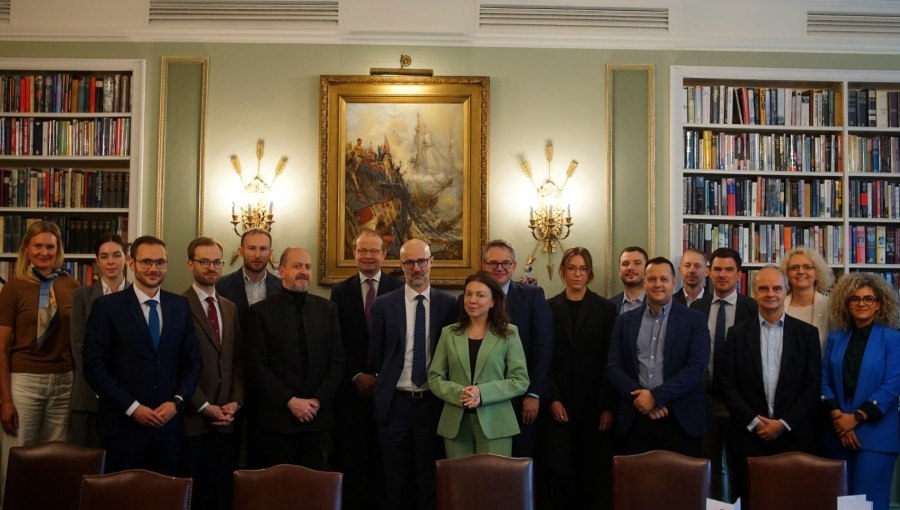Democracy, Technology, Artificial Intelligence, and the Future
The JCU Institute of Future and Innovation Studies organized a roundtable discussion called “Democracy, Technology, Artificial Intelligence, and the Future,” on September 10, 2021. The discussion was the first event in the “Democracy Watch” series, which aims to provide a public forum for maintaining a critical and open dialogue about the complex relationships that exist between technology and democracy.
JCU President Franco Pavoncello welcomed the participants and gave the opening remarks. Francesco Lapenta, Director of the Institute of Future and Innovation Studies, explained that with technology continually evolving, it is essential to understand its relationship with democracy. According to Lapenta, technological advances have a direct impact on democratic practices and values. The history of technology includes both innovations and challenges to democratic processes and governance. Technology can be conceived of and designed as a tool to support both private and public forms of democratic participation. It can, however, also be used by authoritarian regimes to maintain power and control dissent. This dichotomy becomes more complicated when we look at the world’s most advanced democracies, where new forms of corporate power and centralization, as well as evolving forms of digital influence and surveillance tools, appear to undermine the very foundation of fair and democratic participation.

From left: JCU President Franco Pavoncello, Director of the Institute of Future and Innovation Studies Francesco Lapenta, and Paul Nemitz
Said Francesco Lapenta, “If democracies are to win the battle against authoritarian regimes over the democratic use of existing and emerging technologies, they must be able to prove and articulate the profound differences that exist between the two models.” The roundtable, which included experts from a variety of institutional, academic, and professional backgrounds, focused on a medium-long term assessment of the role that existing and emerging technologies may play in sustaining or undermining democratic values and processes.
The participants were asked which existing or emerging technologies or applications they believed will have the greatest impact on democratic institutions and representation processes over the next ten years, what to expect, and how to act in order to ensure that technological innovation promotes democratic values and practices. Lapenta also asked each participant to pick a color among yellow, orange, and red (with red symbolizing the highest risk level), to describe how they thought existing and evolving technologies will impact democracy.
The speakers presented their perspectives and touched on different aspects of the relationship between technology and democracy. Due to the fact that globalization and technological evolution have created a new reality, it’s important to keep in mind the role of technological platforms, such as social media, and what kind of responsibility they have in legal, ethical, and political terms. The issue of intellectual property should also be taken into account, as well as technological innovation, among other things.
A portion of the discussion centered on evaluating the current balance of public and commercial interests represented by modern digital platforms. The suggestions centered on the possibility of developing European public-service platforms that are managed by public institutions and are designed for a direct relationship between public services and servants with citizens, as well as the role that the development of European data-sharing platforms could play in ensuring equal access to open data for the common good.
The interconnectedness between democracy and technology calls for an increased level of security regarding emerging technologies, as they might threaten democracy. However, technology might also be useful to democracy as it helps decentralize power, reduce corruption, and improve accountability. Moreover, technology plays a significant role in human rights and freedom of expression. Some technologies even promote a green world.
A.I. is a high-risk technology and a threat to human reason because even though it was created by human intelligence, it might surpass it. If a superintelligence should be developed in the future, the situation will change, therefore it’s essential to reflect on how A.I. affects human thinking and have more discussions and regulations on the topic, and “control technology before it controls us,” said Matthias Pfeffer.
The topic of A.I. was also explored in relation to the economy, China, the public sphere, health, innovation, digitalization, private and public goods, information, efficiency, and privacy. One of the final questions raised at the end of the discussion was whether the supremacy will be in the hands of machines or humans.
Based on the answers of the participant and on the colors that they chose to attribute to the future of democracy and technology, the situation is in between “orange and red,” which according to Lapenta is good because it means that people are aware of the threats of technology, and they are alert and aware of the responsibility to maintain the agency of humans.
Participants:
- Franco Pavoncello, President John Cabot University
- Francesco Lapenta, JCU, Director Institute of Future and Innovation Studies
- Paul Nemitz, Principal Advisor in the EU Directorate-General for Justice and Consumers
- Inese Podgaiska, Secretary-General Association Nordic Engineers
- Fosca Giannotti, Director of Research of Computer Science at the Information Science and Technology Institute “A. Faedo” of the National Research Council, Pisa, Italy
- Enrico Fardella, Peking University (PKU) and Director of PKU’s Center for Mediterranean Area Studies
- Mary Merva, Vice President of Academics John Cabot University
- Gry Hasselbalch, Research lead European Commission’s International Outreach for Human-Centric A.I., Former Member of the European Commission’s EU High-Level Expert Group on A.I.
- Francesco Grillo, Director Think-Tank Vision
- Dorothea Baur, Independent Ethics Consultant, Lecturer, and Speaker
- Stefan Sorgner, Professor at John Cabot University
- Enzo Moavero Milanesi, Professor at Luiss University, Former Minister of Foreign Affairs
- Sebastiano Maffettone, Professor at Luiss University
- Andrea Gilli, Professor at NATO Defense College
- Peter Martey Addo, Head of DataLab at the Innovation, Research, And Knowledge (IRS) Directorate of the French Development Agency (AFD)
- Klaus Bruhn Jensen, Professor at Copenhagen University
- Matthias Pfeffer, Philosopher





